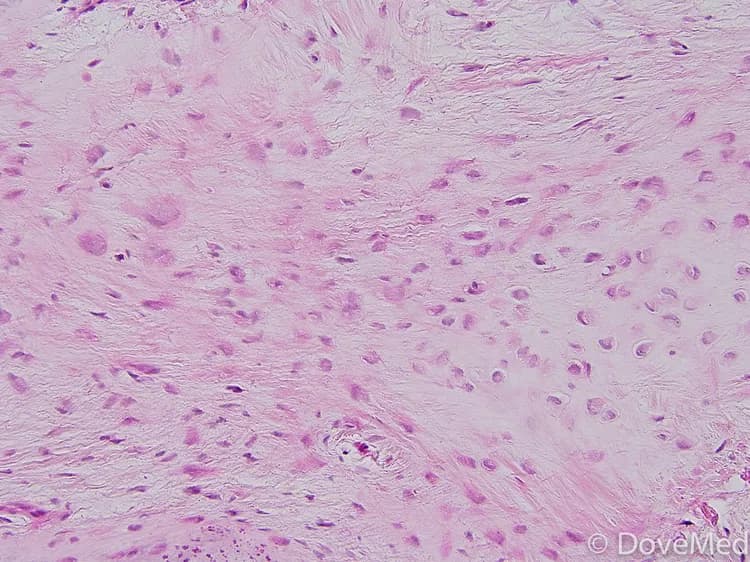What are the other Names for this Condition? (Also known as/Synonyms)
- Articular Ecchondrosis
- Synovial Chondrometaplasia
- Synovial Osteochondromatosis (SOC)
What is Synovial Chondromatosis? (Definition/Background Information)
- Synovial Chondromatosis is a rare condition caused by abnormal tissue growth in a joint. Young and old adults are generally affected
- Even though this abnormal growth is commonly seen around the knee joint, any other joint of the body may be affected
- The risk factors for Synovial Chondromatosis are presently unknown.
- A treatment of the condition is through surgical removal of the tumor mass. An incomplete removal may result in recurrence of the tumor
- An early diagnosis and treatment of Synovial Chondromatosis may help in achieving an excellent prognosis
Who gets Synovial Chondromatosis? (Age and Sex Distribution)
- Synovial Chondromatosis may occur in individuals of all ages, races, and ethnic groups
- This condition is generally seen in young and old adults in the 20-70 years' age group
- It is more common in men than women (man-woman ratio of 2:1)
What are the Risk Factors for Synovial Chondromatosis? (Predisposing Factors)
- The risk factors of Synovial Chondromatosis are presently unknown
It is important to note that having a risk factor does not mean that one will get the condition. A risk factor increases one's chances of getting a condition compared to an individual without the risk factors. Some risk factors are more important than others.
Also, not having a risk factor does not mean that an individual will not get the condition. It is always important to discuss the effect of risk factors with your healthcare provider.
What are the Causes of Synovial Chondromatosis? (Etiology)
Synovial Chondromatosis is caused by the growth of abnormal metaplastic cartilage tissue in the synovium surrounding a joint.
What are the Signs and Symptoms of Synovial Chondromatosis?
The signs and symptoms of Synovial Chondromatosis may include:
- Restricted or decreased range of motion in the affected joints
- Slow increase of pain in the affected joint
- Joint stiffness
- Formation of a mass around the joint
- The condition commonly affects the knee joints (followed by the hip and elbow joints), though other joints may also be affected
- A few cases have been noted that involve the tendons of the hands and feet
How is Synovial Chondromatosis Diagnosed?
A diagnosis of Synovial Chondromatosis may involve:
- A physical examination and evaluation of complete medical history by a healthcare provider
- X-ray of the affected joint
- MRI scan of the affected joint
- Tissue biopsy: The pathological exam of tissue under a microscope by a pathologist is necessary to arrive at a definitive diagnosis. Such an examination of tissue will help in diagnosing Synovial Chondromatosis and eliminating the possibility of traumatic arthritis, osteoarthritis, and osteochondritis dissecans
- Differential diagnosis: This condition is often confused with ‘reactive cartilage tissue growth’ that forms from injury to a joint. Such reactive injury can occur in conditions, such as osteoarthritis of joints, osteochondritis dissecans, and post-injury osteochondral growth
Many clinical conditions may have similar signs and symptoms. Your healthcare provider may perform additional tests to rule out other clinical conditions to arrive at a definitive diagnosis.
What are the possible Complications of Synovial Chondromatosis?
The possible complications from Synovial Chondromatosis include:
- Rarely, the growth can turn into a malignant condition called a chondrosarcoma
- This condition frequently recurs after surgery, because a complete surgical excision is generally difficult to achieve
How is Synovial Chondromatosis Treated?
The treatment of choice for Synovial Chondromatosis is a complete surgical excision. During surgery, the surgeon may find multiple free-floating cartilaginous loose bodies in the joint space.
How can Synovial Chondromatosis be Prevented?
Currently, there are no specific methods or guidelines to prevent Synovial Chondromatosis.
What is the Prognosis of Synovial Chondromatosis? (Outcomes/Resolutions)
- The prognosis of Synovial Chondromatosis is generally good with early diagnosis and early treatment
- A lack of treatment or a delayed treatment may result in complications
Additional and Relevant Useful Information for Synovial Chondromatosis:
The following DoveMed website link is a useful resource for additional information:
Related Articles
Test Your Knowledge
Asked by users
Related Centers
Related Specialties
Related Physicians
Related Procedures
Related Resources
Join DoveHubs
and connect with fellow professionals


0 Comments
Please log in to post a comment.